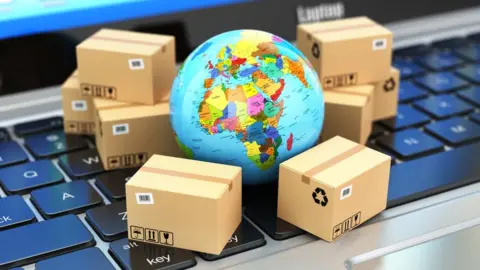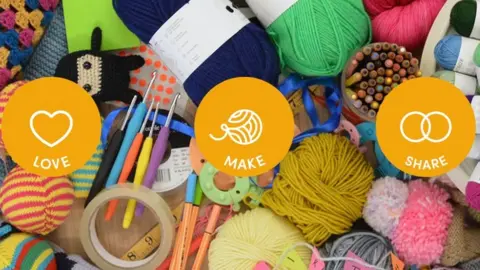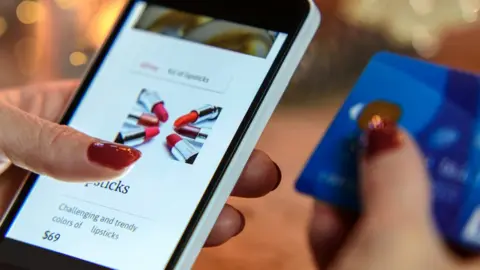How can you help your local online business go global?
 Getty Images
Getty ImagesIn 1995, someone sold a broken laser pen for $14 on a site called AuctionWeb. This was the rather inauspicious start for online shopping, an activity that now generates a colossal $2.3tn (£1.75tn) in global sales.
But these days, shoppers want to pay in any number of ways and this can cause headaches for retailers wanting to expand abroad; so what should they do?
Nigel Whiteoak is the co-founder of LoveCrafts, a virtual hub for knitting and crochet enthusiasts to share their creations and buy supplies.
Having a website rather than a bricks-and-mortar shop meant the team could sell their wares to the world. But taking payments for these international sales wasn't proving straightforward.
"One of the biggest realisations we had when looking to expand was that credit card penetration is generally much lower in most markets outside the UK and US," he explains.
"In Germany, open invoices are very common where you process the payment using a third party, deliver the goods directly to the customer, and then they pay that third party once we have delivered their crafts.
 LoveCrafts
LoveCrafts"Whereas in Brazil and Turkey they tend to use local credit cards and pay in instalments."
These regional quirks were difficult to cater for.
But then he came across a Dutch payment company, Adyen, whose payment processing platform harnesses machine learning to customise the payment method depending on which country the buyer is in.
Adyen's clients include heavyweights such as Netflix, Uber and Spotify, so Mr Whiteoak was surprised to find out how affordable its service was, with a minimum monthly invoice of $100 (£75) and transparent per-transaction processing and commission charges.
"Before we started selling outside of the UK we had a turnover of around £6.5m," he says. "Last year we posted 10.9 million, and with the bulk of our sales coming from overseas, this growth is directly linked to our ability to offer local payment methods."
Sales have grown 125% over the last three years, he says, proving that knitting and crochet is big business.
 LoveCrafts
LoveCraftsPayment difficulties contribute to about 15% of online shoppers abandoning their virtual shopping baskets before completing the purchase, research suggests. That and difficult-to-navigate, fiddly websites.
Research from Barclaycard finds that while customers demand faster, more innovative and mobile-friendly ways to pay, the reality is one of declined cards, verification delays and annoying hidden transaction fees.
"Remove the need for consumers to set up an account first," advises Greg Liset, Barclaycard's head of small business, "and partner with suppliers that have reliable payment systems that work first time.
"Also, with online cross-border sales expected to soar over the next few years, being able to offer multiple currencies is essential."
Knowing what payment options locals prefer is crucial to e-commerce success.
Research from 2Checkout finds that in the US, Visa, MasterCard, PayPal and American Express still dominate the payments landscape.
But in other countries different favourite payment methods have emerged. For example, in China Alipay now accounts for 54% of online sales. In the Netherlands the iDEAL payment system is used for 44% of sales. In Japan, JCB and Konbini are popular.
 Getty Images
Getty ImagesBut in India many shoppers still prefer paying in cash. So Indian start-up BookMyTrain is aiming to simplify the online purchase of rail tickets by offering a cash-on-delivery payment option with its app, as many people in India don't have payment cards.
It is also using chatbots to take customers through the booking process one step at a time.
Simon Johnson, general manager at software provider Freshworks, the firm providing the chatbots for BookMyTrain, says: "Most customers today use messaging apps such as WhatsApp or Facebook Messenger because they like how you can keep a conversation going with whatever device they are using.
"You don't have to be a massive company to personalise the experience more effectively and [smaller] retailers need to have that personal touch to compete with big e-commerce players."
Other payment platforms besides Adyen helping online retailers sell globally with tailored experiences include 2Checkout (formerly Avangate), PayU, PayPal, Stripe and Braintree.
More Technology of Business
 Getty Images
Getty ImagesCosts are usually transparent and related to sales volume. With PayPal, for example, retailers can expect to pay 2.9 % of the transaction value plus about 23p per order. Similarly, Stripe doesn't charge extra for accommodating different cards or currencies with a flat rate of 1.4% plus 20p per transaction.
But selling abroad isn't just about offering flexibility over ways to pay and support for multiple currencies, it's also about understanding local customs and cultures, argues Nir Debbi, co-founder of e-commerce platform Global-e.
"A common pitfall for businesses marketing themselves abroad is a lack of awareness of the different cultural phenomena," says Mr Debbi.
Planning for international shopping events such as Singles Day in China or Japan's "lucky shopping bags" at New Year "can improve international conversion rates dramatically", he says, "but you need the insight, local knowledge and access to these sales peaks to be able to plan and apply an appropriate strategy."
Later in this e-commerce series we'll explore the best ways for online businesses to market themselves.
